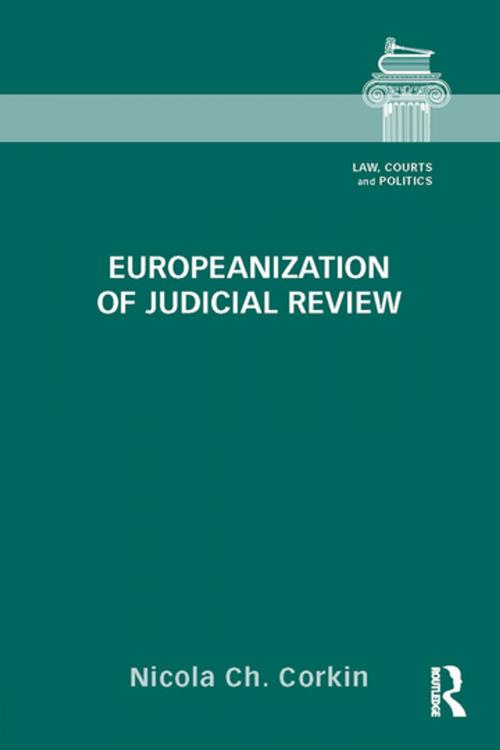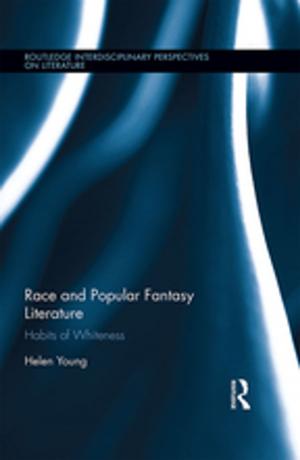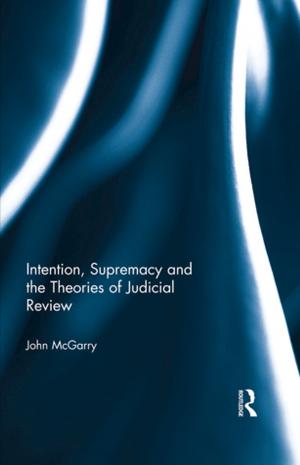Europeanization of Judicial Review
Nonfiction, Social & Cultural Studies, Political Science, International, Foreign Legal Systems, Politics, History & Theory, Government| Author: | Nicola Ch. Corkin | ISBN: | 9781134680566 |
| Publisher: | Taylor and Francis | Publication: | November 13, 2014 |
| Imprint: | Routledge | Language: | English |
| Author: | Nicola Ch. Corkin |
| ISBN: | 9781134680566 |
| Publisher: | Taylor and Francis |
| Publication: | November 13, 2014 |
| Imprint: | Routledge |
| Language: | English |
Europeanization of Judicial Review argues that the higher complexity of the political framework in which laws are made today leads to less well-designed laws and loop-holes, allowing politicians to leave decisions to the courts. The higher complexity of the political framework is a result of the need in the EU to consider both national and European legal and political rules when phrasing new laws. Both to decrease the complexity in the design of legislation and to preserve the ideal of the rule of law, the courts now are more likely to rule laws unconstitutional.
The book employs a wide range of quantitative and qualitative methods to collect new data about the German, Austrian, and Italian constitutional courts over the last four decades. These three courts have a comparable history, theoretical background, and structure while differing in two key components: length of EU membership and legitimacy perception. Corkin employs multi-method research based on over fifty interviews with judges, politicians and civil servants; content analysis of abstract judicial review cases over three decades; and a database of over 300 variables relating to the courts and their surroundings. Her data reveals that in abstract judicial review, and in the wider political arena, political culture has become more confrontational due to attitude changes in politicians and judges. These attitude changes can be directly linked to the EU and have wide-ranging implications for legitimacy, democracy and political methodology.
Presenting a bridge between the revitalized realist and legalist debate, Europeanization of Judicial Review will contribute to socio-legal theory, literature on comparative courts, and both new institutionalism and Europeanization theory.
Europeanization of Judicial Review argues that the higher complexity of the political framework in which laws are made today leads to less well-designed laws and loop-holes, allowing politicians to leave decisions to the courts. The higher complexity of the political framework is a result of the need in the EU to consider both national and European legal and political rules when phrasing new laws. Both to decrease the complexity in the design of legislation and to preserve the ideal of the rule of law, the courts now are more likely to rule laws unconstitutional.
The book employs a wide range of quantitative and qualitative methods to collect new data about the German, Austrian, and Italian constitutional courts over the last four decades. These three courts have a comparable history, theoretical background, and structure while differing in two key components: length of EU membership and legitimacy perception. Corkin employs multi-method research based on over fifty interviews with judges, politicians and civil servants; content analysis of abstract judicial review cases over three decades; and a database of over 300 variables relating to the courts and their surroundings. Her data reveals that in abstract judicial review, and in the wider political arena, political culture has become more confrontational due to attitude changes in politicians and judges. These attitude changes can be directly linked to the EU and have wide-ranging implications for legitimacy, democracy and political methodology.
Presenting a bridge between the revitalized realist and legalist debate, Europeanization of Judicial Review will contribute to socio-legal theory, literature on comparative courts, and both new institutionalism and Europeanization theory.















